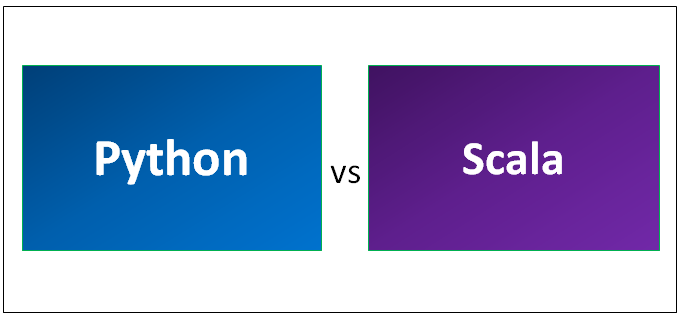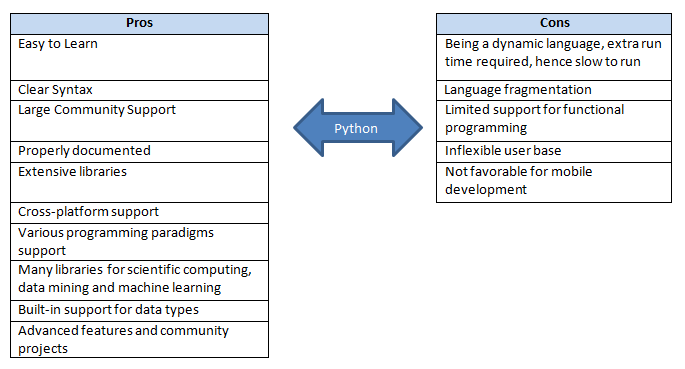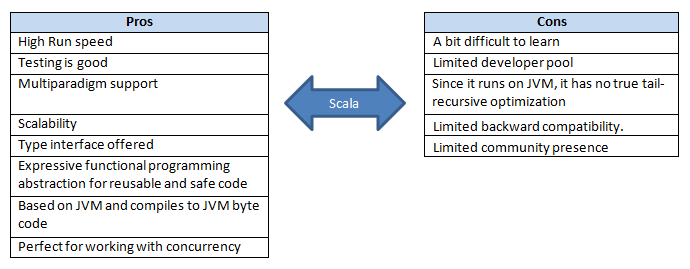Differences Between Python vs Scala
Python and Scala are the two major languages for Data Science, Big Data, and Cluster computing. Python is an interpreted high-level object-oriented programming language. It is a dynamically typed language. It has an interface to many OS system calls and supports multiple programming models, including object-oriented, imperative, functional, and procedural paradigms. Scala is also an object-oriented programming language. It is used to support functional programming and a strong static type system. Scala gets its name as a blend of ‘scalable’ and ‘language’, where it can scale according to the number of users, and here, everything is an expression. It smoothly integrates the features of object-oriented and functional languages.
Let us study much more about Python and Scala in detail:
Python and Scala are general-purpose programming languages that support the Object-Oriented model to create applications. Python and Scala’s languages play a crucial role in the growth and future of data science projects. But at the same point in time, both Python vs Scala has a few pros and cons.
Pros and Cons of Python and Scala
Following are some pros and cons of Python and Scala:
Python (Pros and Cons)
Scala (Pros and Cons)
Head-to-Head Comparison Between Python and Scala (Infographics)
Below are the top 9 comparisons Between Python and Scala:
Key Differences Between Python and Scala
The differences between Python and Scala are explained in the below-mentioned points:
- Python belongs to the dynamically typed interpreted languages category, whereas Scala falls under the statically typed compiled languages category.
- Python seems more productive for development and doesn’t need compilation for most cases, making development faster and more rapid. In the case of Scala, a compilation is too slow; thus, developing the Scala application takes more time.
- Python has huge libraries per the different task complexities. In the case of Scala, its libraries are small.
- While multiple platforms are available for Python, most Python applications are executed using CPython. In contrast, Scala applications run on the JVM.
- In the case of Python, the low level can be achieved by extending using C and C++. For Scala, it is not easy to achieve a low level and mostly rely on JVM.
- Python has decent memory usage, whereas Scala has more memory consumption.
- Python is much easier to learn than Scala.
- Being a dynamic language, Python executes more slowly than Scala
- Python is less complex to test because of being dynamic, whereas being static; Scala is good for testing
- Python is a mature language, and its usage continues to grow. But in the case of Scala, it doesn’t have widespread use or a knowledge base.
Recommended Courses
Python and Scala Comparison Table
The set of points shows the comparison between Python and Scala.
| Basis For Comparison | Python | Scala |
| Definition | Python, a dynamically typed object-oriented programming language, does not require object specification. | Scala is an Object-Oriented Programming language that is statically typed. Thus, we need to specify the type of variables and objects in Scala. |
| Performance | Python, a dynamically typed language, creates extra work for the interpreter at runtime. It has to decide the data types during runtime. | Scala is a statically typed language that uses the JVM; thus, it is 10 times faster than Python. Therefore, Scala should be preferred over Python when dealing with large data processes. |
| Platform | Python has an interface to many OS system calls and libraries. It has many interpreters. | Scala relies on the JVM, and developers compile its source code into Java Byte Codes, which the JVM executes. Since Scala is a compiled language, all source code must be compiled before execution. |
| Simplicity | Python is easy to learn and use. Its English-like syntax contributes to its popularity. It is easy for developers to write code in Python. | Scala is less difficult to learn than Python. However, Scala plays a much more significant and critical role in concurrent and scalable systems than Python. |
| Concurrency | Python doesn’t support proper multithreading, though it supports heavyweight process forking. | Scala has a list of asynchronous libraries and reactive cores; hence, it is a better choice for implementing concurrency. |
| Type of Safety | When changing existing code, Python, a dynamically typed language, can be prone to bugs. Although it may be suitable for small-scale projects, it does not provide sufficient support for scalable features. | Scala’s static typing offers a mechanism to detect compile-time errors. Thus refactoring code in Scala is much easier and ideal than in Python. |
| Testing | Being a dynamic programming language, Python’s testing process and methodologies are much more complex. | Scala’s static typing enables better testing capabilities. |
| Support | Scala’s community is much smaller in comparison to Python’s. | Both are open source, and Scala also has good community support. But still, it is lesser than Python. |
| Advanced Features | Python has proper data science tools and libraries for Machine learning and Natural Language Processing (NLP). Scala does not have that many tools to work on machine learning and NLP. | Scala has various existential types, macros, and implicit. The syntax with advanced features may be slightly more complex than usual functions. Frameworks and libraries, however, allow the developers to make good use of these features. |
Conclusion
Comparing Python and Scala based on various factors, it becomes clear that selecting either language depends entirely on which features best fit the project’s requirements, given that each language has its unique strengths and weaknesses. So, before deciding on a language for programming, developers should learn and analyze different Python and Scala language artifacts. Thus, selecting one of these languages to achieve the desired outcome depends on project requirements, time constraints, and other discussed factors.
Recommended Articles
This has been a guide to Python vs Scala. Here we discussed Python vs Scala head-to-head comparison, key differences, infographics, and comparison table. You may also look at the following articles to learn more –






